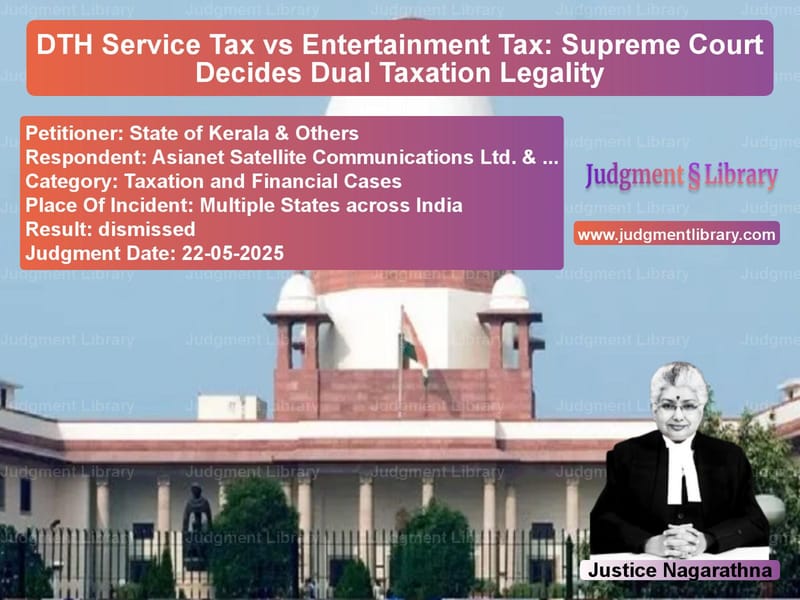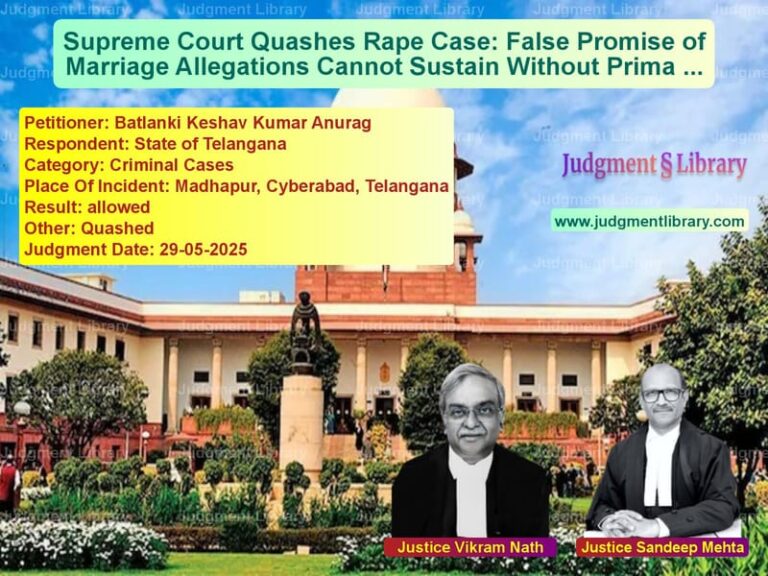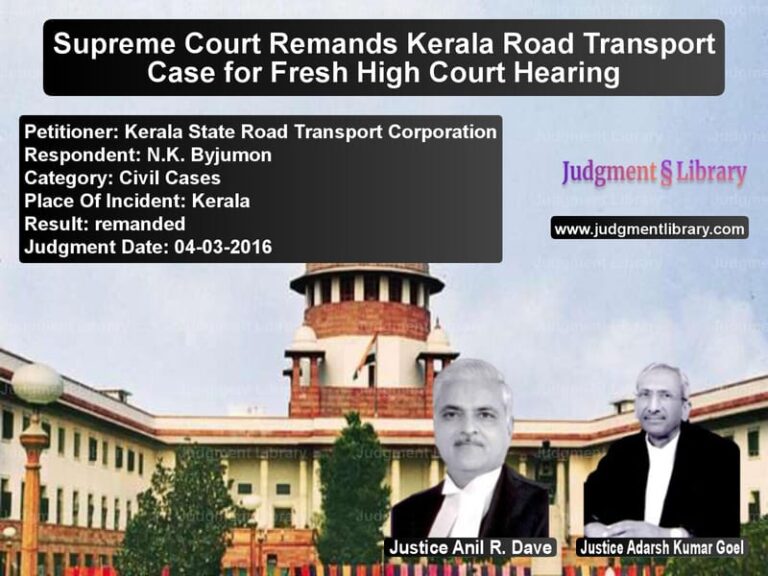DTH Service Tax vs Entertainment Tax: Supreme Court Decides Dual Taxation Legality
The Supreme Court of India recently delivered a landmark judgment addressing a complex constitutional question that had been troubling the broadcasting industry and state governments for over a decade. At the heart of the matter was whether both the Central Government and State Governments could tax the same activity – Direct-to-Home (DTH) television services – under different legislative powers.
The controversy began when multiple state governments amended their entertainment tax laws to include DTH services within the definition of “entertainment.” This meant that DTH operators like Tata Play (formerly Tata Sky), Dish TV, Airtel Digital TV, and others would have to pay entertainment tax to state governments in addition to the service tax they were already paying to the Central Government under the Finance Act.
The DTH operators challenged these state amendments before various High Courts, arguing that they were being subjected to double taxation on the same activity. When most High Courts ruled against them, they approached the Supreme Court through civil appeals. Simultaneously, some operators also filed writ petitions directly before the Supreme Court challenging the constitutional validity of the service tax provisions.
The Core Legal Question
The fundamental issue before the Court was whether state legislatures had the competence to levy entertainment tax on DTH services under Entry 62 of List II (State List) of the Seventh Schedule of the Constitution, particularly when Parliament was already levying service tax on the same activity under Entry 97 of List I (Union List).
Entry 62 of List II specifically empowers state legislatures to impose “Taxes on luxuries, including taxes on entertainments, amusements, betting and gambling.” Meanwhile, Entry 97 of List I is a residuary entry that allows Parliament to legislate on “Any other matter not enumerated in List II or List III including any tax not mentioned in either of those Lists.”
Arguments of the DTH Operators
The appellants (DTH operators) made several compelling arguments before the Court. Senior Advocate Sri Datar contended that the word ‘entertainments’ in Entry 62 is not the plural of ‘entertainment’ but is nomen juris (a legal term) that means only public entertainment to the exclusion of private entertainment. He argued that “the word ‘entertainments’ is not the plural of ‘entertainment’ but is nomen juris. This line of argument was advanced to contend that the State cannot expand its taxing power by including DTH services within the meaning of the word ‘entertainments’.”
Senior Advocate Sri Bagaria emphasized the exclusive nature of broadcasting as a Union subject, arguing that “the fact that neither Entry 62 – List II nor any other entry in the State List explicitly mentions taxes on broadcasting shows that any and all taxes on broadcasting can be imposed exclusively by the Parliament.” He relied on Article 248(2) of the Constitution which provides for Parliament to make any law imposing a tax not mentioned in either the Concurrent list or the State list.
Another senior advocate, Sri Gulati, argued that DTH operators are merely conduits in the entire process and do not exercise control over content. He outlined that “entire activity of appellants is in relation to transmission of DTH signals; and neither do appellants exercise any control over the content received from the broadcaster nor do they control exhibition of the content.”
The appellants also challenged the application of the ‘aspect theory’ – a legal doctrine that allows different aspects of the same transaction to be taxed by different legislatures. They contended that “the activity of broadcasting is only one indivisible transaction which cannot be artificially split into two taxable events.”
Significantly, Senior Advocate Sri K.K. Venugopal argued that the Court’s earlier decision in Purvi Communication (which had upheld entertainment tax on cable operators) was per incuriam (decided without considering relevant law) as it didn’t follow the reasoning in Geeta Enterprises, which had held that entertainment tax requires a ‘public colour’ to the entertainment.
Arguments of the State Governments
The respondent states presented equally compelling arguments defending their legislative competence. Senior Advocate Sri Jaideep Gupta for West Bengal argued that there is no conflict between Entry 62 of List II and Entry 97 of List I. He relied on the Court’s observation in Western India Theatres that “the entry contemplates luxuries, entertainments, and amusements as objects on which the tax is to be imposed. If the words are to be so regarded, as we think they must, there can be no reason to differentiate between the giver and the receiver of the luxuries, entertainments, or amusements and both may, with equal propriety, be made amenable to the tax.”
Senior Advocate Sri Radhakrishnan for Tamil Nadu provided a historical perspective of entertainment taxation in his state, showing how the legislation had evolved from taxing only cinema halls to including cable television and eventually DTH services. He argued that “in today’s society, it is pedantic to contend that the term ‘entertainment’ does not cover within its ambit DTH service providers.”
The states consistently argued for the application of the ‘aspect theory,’ contending that service tax and entertainment tax operate in completely different fields – one taxes the service of broadcasting, while the other taxes the entertainment derived from the content. Senior Advocate Sri Prectesh Kapur for Odisha explained that “had the liability been imposed directly upon the subscriber, the distinction between service tax on the services rendered by the DTH operator and entertainment tax upon the subscribers would have been self-evident.”
The states also emphasized that the Constitution is an organic document that must adapt to technological changes. They argued that “the vision of the founding fathers cannot, by a process of artificial construction, be frozen at the scientific knowledge and technology which was available at the point of time when the Constitution was drafted.”
The Supreme Court’s Analysis and Decision
After extensive hearing and consideration of voluminous material, the Supreme Court delivered its judgment, upholding the states’ power to levy entertainment tax on DTH services. The Court provided a comprehensive analysis of the constitutional scheme of legislative powers.
The Court emphasized that “taxation is considered to be a distinct matter for purposes of legislative competence and the power to tax cannot be deduced from the general legislative entry as an ancillary power.” This meant that even though Parliament has the power to regulate broadcasting under Entry 31 of List I, this doesn’t automatically include the power to tax the entertainment aspect of broadcasting.
The Court gave a wide interpretation to the expression “entertainments” in Entry 62, observing that “the expression ‘entertainments’ is a word of general import and in common parlance, it includes cinema shows, dramatic performances, etc.” The Court rejected the argument that entertainment must have a ‘public colour,’ noting that “with the advancement of technology, there can be entertainment provided within the private space or the household also by means of television or other electronic gadgets.”
On the crucial question of dual taxation, the Court applied the ‘aspect theory,’ holding that “a levy of service tax on a broadcaster is not a levy on an activity which is in the realm of entertainment. Conversely, a levy of entertainment tax by a State under Entry 62 – List II is not a levy on the activity/service of broadcasting but on the activity of providing and receiving entertainment.”
The Court also addressed the argument about the residuary powers of Parliament under Entry 97 of List I, holding that “Entry 97 – List I can be invoked only when any matter is not enumerated in List II or List III including any tax not mentioned in the said Lists. There is no specific entry for levy of tax on entertainments and amusements in List I. It is only in Entry 62 – List II.”
The Court summarized its conclusion by stating that “the tax sought to be imposed by the State Legislatures by way of the impugned Acts, is traceable to the power conferred on the State Legislatures under Entry 62 – List II. The said entry contemplates imposition of taxes, inter alia, on the entire genus of ‘entertainments and amusements’.”
Implications of the Judgment
This judgment has significant implications for the broadcasting industry, state finances, and constitutional interpretation. By upholding the states’ power to tax DTH services as entertainment, the Court has provided state governments with a substantial source of revenue in an era where traditional entertainment venues like cinema halls are increasingly being supplemented or replaced by digital entertainment at home.
The judgment also reinforces the federal structure of India’s Constitution by preserving the taxation powers of states in their designated fields. At the same time, it acknowledges the evolving nature of technology and the need for constitutional interpretation to adapt to these changes.
For consumers, this means that the dual taxation structure on DTH services will continue, with service tax going to the Central Government and entertainment tax to state governments. However, the Court’s clear demarcation of the taxation domains provides certainty to the industry and prevents future litigation on this issue.
The judgment represents a careful balancing of federal powers, recognizing that the same transaction can have multiple aspects that fall within the legislative competence of different levels of government. In doing so, the Court has preserved the constitutional scheme of distribution of legislative powers while acknowledging the realities of technological advancement in the entertainment industry.
Petitioner Name: State of Kerala & Others.Respondent Name: Asianet Satellite Communications Ltd. & Others.Judgment By: Justice Nagarathna.Place Of Incident: Multiple States across India.Judgment Date: 22-05-2025.Result: dismissed.
Don’t miss out on the full details! Download the complete judgment in PDF format below and gain valuable insights instantly!
Download Judgment: state-of-kerala-&-ot-vs-asianet-satellite-co-supreme-court-of-india-judgment-dated-22-05-2025.pdf
Directly Download Judgment: Directly download this Judgment
See all petitions in Income Tax Disputes
See all petitions in GST Law
See all petitions in Tax Evasion Cases
See all petitions in Banking Regulations
See all petitions in Tax Refund Disputes
See all petitions in Customs and Excise
See all petitions in Judgment by B.V. Nagarathna
See all petitions in dismissed
See all petitions in supreme court of India judgments May 2025
See all petitions in 2025 judgments
See all posts in Taxation and Financial Cases Category
See all allowed petitions in Taxation and Financial Cases Category
See all Dismissed petitions in Taxation and Financial Cases Category
See all partially allowed petitions in Taxation and Financial Cases Category







